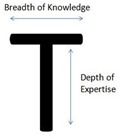Historically managers have been described as T-shaped, and that was a good thing. What that meant was that someone would learn their technical discipline, and rise up the organisation in their discipline until they got to management level, when they would interact with managers in different disciplines and all would learn from one another to provide the horizontal element of the T. They have a depth of expertise and develop a broad base of knowledge.
The benefit is supposed to be the collaborative horizontal element assumes that managers do not revert to type when under stress or threat, but really collaborate using emotionally intelligent methods rather than just simply learning technical aspects of their colleagues’ disciplines. Unfortunately, in many cases the latter is what happens, certainly in small businesses.
Often someone starts a business in the technical area they know, and it grows from there with them learning elements of other business disciplines as and when needed. The bad news is that it is like creating a jigsaw without having the picture – so the poor business owner doesn’t know what he doesn’t know. Decision making is difficult and it’s difficult to measure effectiveness.
In a larger organisation it can mean that managers revert to type as, following the analogy, the vertical part of the T is longer than the horizontal part is wide. So managers might protect their own turf at the expense of the big picture. They can still end up thinking linearly using their own vocabulary, defending their own technical area and fighting like ferrets in a bag with their peers.
There has been plenty of research on T managers, with plenty of data available and case studies. This is all well and good, and it is useful to study history to avoid repeating it, but it is still history and we need to look to the future.
Given that SMEs need to fill in owner knowledge gaps and to put everything in context – in other words provide the jigsaw picture – they need a more generalist approach. The usual solution (especially from accountants, sticking to their knitting) is to provide a part-time or virtual finance director, and that implies you need a virtual every other sort of director to fill in all the gaps.
Whilst we are keen to promote strategic partnerships, we can’t think that the virtual board is going to provide a cost-effective solution, especially as the SME has simply employed virtual T managers, who may exhibit all the good characteristics but also may exhibit the bad ones.
Better perhaps a part-time generalist – general manager – with a decent grounding in most of the business disciplines. This can lead to a transfer of knowledge from the GM to the business owner whilst knowledge gaps are being filled in a way which will contribute far better to objectives.
We regularly source or provide part-time GMs or part-time managers for the business disciplines which are lacking, with a view to transferring knowledge to the business owner. We find that the more they know, the better the questions they ask and the better decisions they make. And the better and easier their businesses perform.

